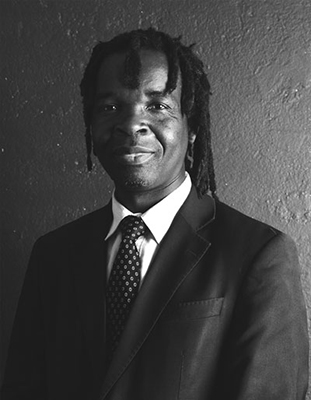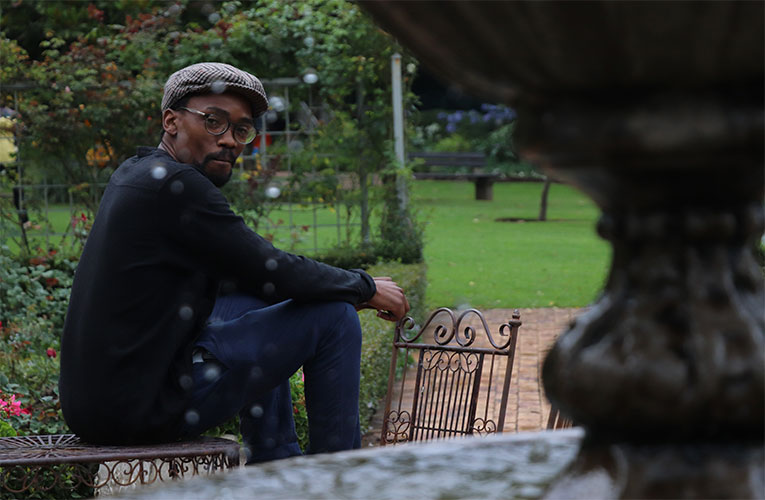Phumlani Ntuli’s exhibition takes a viewer into the complexities of the fantasy world known as Kwanqingetshe
By Edward Tsumele, CITYLIFE/ARTS Editor

The space is full of characters of all type, shape and behavioral patterns. Some are struggling, others are doing fine, while there are also those that are grabbing the scarce resources for themselves and leaving nothing for the rest.. And under such toxic circumstances of scarcity, greed, a huge population of different characters and where social contradictions are well pronounced, conflict is bound to happen and it does happen in Ntuli’s Kwanqingetshe.
This space could be real, such as in the city, or its periphery, in a country, on a continent or actually the world. It could also be non physical, but existing in the imagination. But it exists, and If it sounds like a place in a country, on the continent or globe that you may be familiar with, it is okay, because that is the whole purpose of this exhibition, I guess. That is how the artist Phumlani Ntuli would like you to imagine this place of horror, stories pregnant with several layers lying upon each other, adding to its complexity. Simply put this is a place that carries the burdens of this contemporary world in general and the African continent in particular.
Multi-media artist, Ntuli who is comfortable working in paint as he is in video installation in this fantasy world called, is attempting to tell the complex story of contemporary existence with its challenges of scarcity, poverty, capitalist greed and lack of compassion among people.
In fact in this exhibition, the artist through a video installation, painting on canvas and collage, he derives some of his material mainly from personal photographic memory of himself as he grew up to try and make sense of world around him. The artist is telling several stories that may sound familiar to many people, mainly stories of life’s challenges in post colonial African state today..
In Ntuli’s fantasy world, there are images of people on make-shift boats crossing seas in these perilous journey on boats that can disintegrate in the middle of the Mediterranean Sea anywhere any time as the try to move away from a place they call home to an unknown place that somehow promises a hazy but ill-defined future.
This is clearly in reference to several Africans that every year risk everything, a loving family back home, wives, boyfriends and girlfriends to undertake a dangerous journey to Europe on rickety boats to try and create a better life for themselves in these unknown and often hostile lands and countries where the reception is not always warm.
This is as the post colonial state in Africa fails to accommodate the dreams and aspirations of many of its citizens. Instead of enjoying the fruits that should come with freedom, young people are faced with hunger and despair as the economies are mismanaged by the ruling political elite through a devastating toxicity of corruption, economic mismanagement and greed, forcing many to dream of a life elsewhere as home is no longer hospitable, and else where except home, the sun seems to be rising and the light seems to be shining,
And ironically these places of hope happen in some cases, to be homes of the former colonizers. This is not an indictment on the desperate people leaving, but the political elite who have wreaked economic havoc, in some cases, making the economies of the countries they claim to lead worse than they were during colonial days.
This is the world Ntuli wants you to investigate with him through this complex exhibition that touches on everything that is not working in different societies on the continent.
The exhibition also deals with a number of other issues besides immigration, such as the land issue and who controls it. The limited resources available for use by society and who happens to get a better share of that. The exhibition investigates the issue of inequalities that are still very much part of a post colonial state in Africa. The exhibition deals with family fragmentation in African societies to an extent that to call yourself this ethnic group or that nation looks like a big joke in contemporary society simply because families are so blended that there is no such a thing as a distinct ethnic group left to speak of.
“This body of work at a different level is also biographical as it also takes me back in years as a young boy trying to grasp who I am in society. For example, I use a lot of seShoshoe colours as a representation of my seSotho heritage, which happens to be stronger than that of my Zulu heritage. I am born of a Mosotho mother and a Zulu father, but personally my mother’s side is stronger than my father’s side,” Ntuli said as he took a group of visitors on a walk about on Saturday, June 12, 2021, at the Bag Factory in Fordsburg.
The exhibition is curated by Ruzy Rusike, who just like Ntuli, also has a blended family background.
“I understand well what this body of work is investigating as far as the fragmentation of Ntuli’s family is concerned, especially because I also come from a similar family background, with a Xhosa mother and a Shona father,” Rusike said.
In this body of work, Ntuli mitigates the heaviness of the subjects he is dealing with by using pink paint as a way of taming the heaviness of the subject matter.
The subject matters in this exhibition are clearly heavy and demand that a visitor for a moment stops and allow this fantasy world Ntuli has created to take over your imagination and take the viewer to spaces a and places that may sometimes make him or her uncomfortable.
Curator Rusike has chosen to explain this body of work in the following way in her curatorial note.
“Mirrors have an ethereal, occult place within the collective culture of humanity – they are often seen as conduits offering a clear, unblemished reflection of what truly is. Yet in mirrors, we often see a haunting inverse of our reality, and the clarity which mir- rors show us is often unwelcome. To search our reflections in a mirror is an uncanny, jarring experience as we are never able to see ourselves in a singular way. Every observance is tinged by our own experiences and imaginations, as well as the experiences of our culture, mythologies, and expectations.
Mirrors, therefore, may not show what is, but rather, show what we expect to see.
Phumlani Ntuli’s work is influenced by this idea of re- flection – an analysis of not only the self, but how we come to define ourselves through our personal and collective stories. For Ntuli, this is an intimate exploration of boyhood into manhood. In his exquisite work on canvas and through collage, the real and the fantastic are blended, as we cannot find the self without delving into both our realities and our imaginations. These ideas define each other rather thanbeing mutually exclusive: the real is underpinned by fantasy, and the fantasy is given depth by reality.
Human beings are an amalgamation: a beautiful, complex tapestry of these kinds of contradictions and only in blending seemingly opposite ideas can there be any harmony with, or the revealing of, the
Self,” said Rusike.
Ntuli’s work is vivid, sharp, and colourful, yet it evokes a fluid, otherworldly quality – like a dream in which you are not quite sure if it is a nightmare or not. It embraces the darkness present in both our
reality and our mythology: there can be no progress towards understanding the self or our collective futurity without embracing the darkness that hasinfluenced and even created us.
This mass of contradictions, this smashing together of disparate ideas, suggests that the understanding of the self is akin to a quantum reality: where all things and possibilities exist at one time. And like quantum mechanics, only through our personal observance of phenomena can we influence theoutcome. The self is a mass of realities and fantasies that all seem to exist at the same time, and each time we observe ourselves, we influence a different definition of who we are. Ntuli explores this reflection and observation through an embracing of reali-
ty, fantasy, science fiction, a dystopic past, and a hopeful Black future, Rusike believes.
In short this body of work is an attempt diagnose and perhaps to untangle the complexities of life in a post colonial state in Africa, where poverty inexplicably exists side by side with a lot wealth, where hunger bites in midst of abundance, where corruption seems to be accepted as a way of life and a necessary political risk and where inequality is is now a matter of reality than an exception..
Phumlani Ntuli’s Kwanqingetshe exhibition is currently on at bag Factory in Fordsburg till June 23, 2021.










